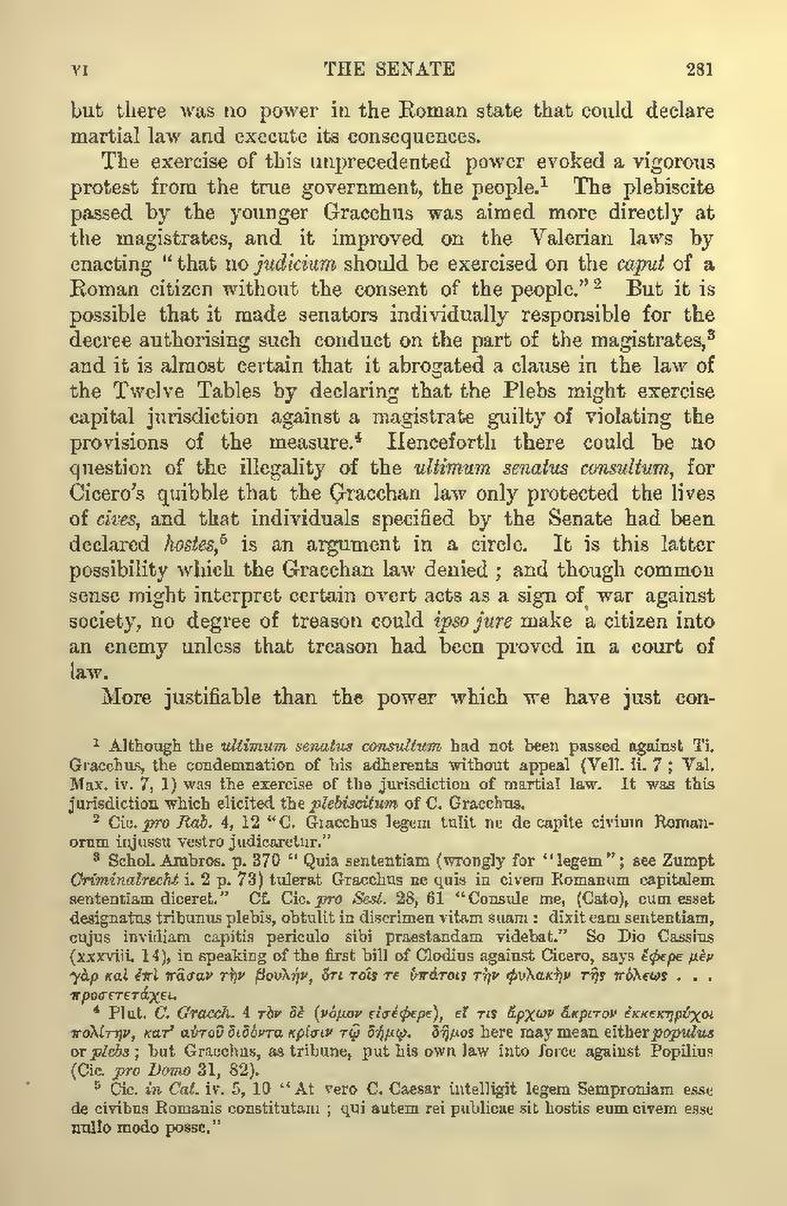but there was no power in the Roman state that could declare martial law and execute its consequences.
The exercise of this unprecedented power evoked a vigorous protest from the true government, the people.[1] The plebiscite passed by the younger Gracchus was aimed more directly at the magistrates, and it improved on the Valerian laws by enacting "that no judicium should be exercised on the caput of a Roman citizen without the consent of the people."[2] But it is possible that it made senators individually responsible for the decree authorising such conduct on the part of the magistrates,[3] and it is almost certain that it abrogated a clause in the law of the Twelve Tables by declaring that the Plebs might exercise capital jurisdiction against a magistrate guilty of violating the provisions of the measure.[4] Henceforth there could be no question of the illegality of the ultimum senatus consultum, for Cicero's quibble that the Gracchan law only protected the lives of cives, and that individuals specified by the Senate had been declared hostes,[5] is an argument in a circle. It is this latter possibility which the Gracchan law denied; and though common sense might interpret certain overt acts as a sign of war against society, no degree of treason could ipso jure make a citizen into an enemy unless that treason had been proved in a court of law.
More justifiable than the power which we have just con-*.]. [Greek: dêmos] here may mean either populus or plebs; but Gracchus, as tribune, put his own law into force against Popilius (Cic. pro Domo 31, 82).]
- ↑ Although the ultimum senatus consultum had not been passed against Ti. Gracchus, the condemnation of his adherents without appeal (Vell. ii. 7; Val. Max. iv. 7, 1) was the exercise of the jurisdiction of martial law. It was this jurisdiction which elicited the plebiscitum of C. Gracchus.
- ↑ Cic. pro Rab. 4, 12 "C. Gracchus legem tulit ne de capite civium Romanorum injussu vestro judicaretur."
- ↑ Schol. Ambros. p. 370 "Quia sententiam (wrongly for "legem"; see Zumpt Criminalrecht i. 2 p. 73) tulerat Gracchus ne quis in civem Romanum capitalem sententiam diceret." Cf. Cic. pro Sest. 28, 61 "Consule me, (Cato), cum esset designatus tribunus plebis, obtulit in discrimen vitam suam: dixit eam sententiam, cujus invidiam capitis periculo sibi praestandam videbat." So Dio Cassius (xxxviii 14), in speaking of the first bill of Clodius against Cicero, says [Greek: ephere men gar kai epi pasan tên boulên, hoti tois te hypatois tên phylakên tês poleôs . . . prosetetachei
- ↑ Plut. C. Gracch. 4 [Greek: ton de (nomon eisephere), ei tis archôn akriton ekkekêrychoi politên, kat' autou didonta krisin tô dêmô
- ↑ Cic. in Cat. iv. 5, 10 "At vero C. Caesar intelligit legem Semproniam esse de civibus Romanis constitutam; qui autem rei publicae sit hostis eum civem esse nullo modo posse."
